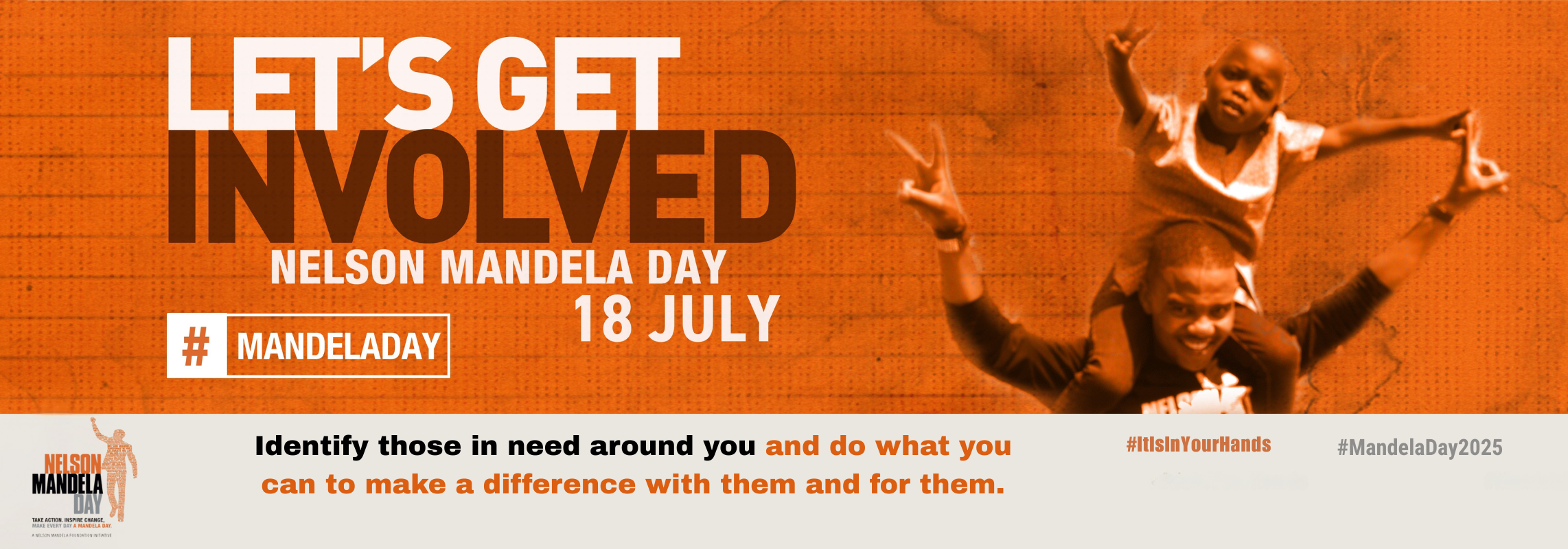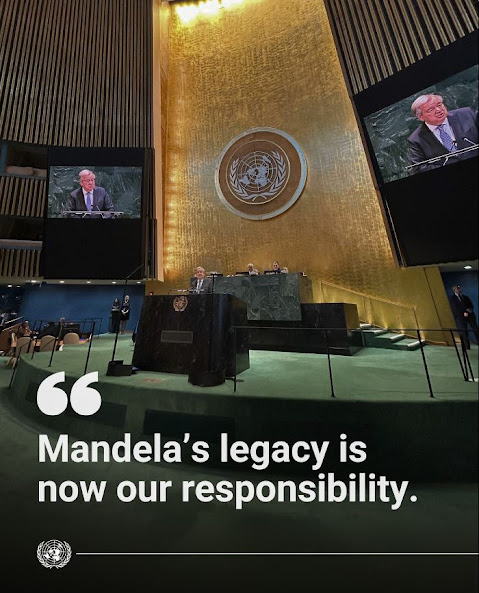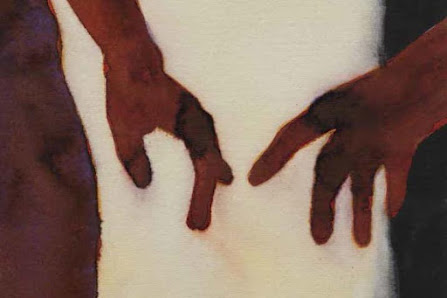FORUM: "It’s still in our hands to combat poverty and inequity." Nelson Mandela International Day 2025. The day is an opportunity for citizens to recognise their individual power to change the world for the better. We can also play a part by raising awareness and expanding the reach of Mandela’s values which include fighting injustice, helping people in need and advancing reconciliation. We can restore our nation by helping one person at a time. Every action we take has a knock-on effect, which will soon snowball into rebuilding our nation. It is through this united front that we can build stronger communities and stronger societies. Government encourages citizens to donate their time to make a difference in their communities this Nelson Mandela Day. Through our actions we can help make sustainable and long-term interventions in combating climate change and food insecurity. Madiba encouraged every individual to take responsibility and be the change they want to see. One area we can bring about positive change is through our fight against climate change which is impacting numerous areas of life including food security. Today and every day, Let us find hope in Nelson Mandela’s example and inspiration in his vision; Let us honour Nelson Mandela’s legacy by taking action: By speaking out against hate and standing up for human rights. By embracing our common humanity – rich in diversity, equal in dignity, united in solidarity and by making our world more just, compassionate, prosperous, and sustainable for all. Follow the conversations with the hashtags; #MandelaDay, #Itisinyourhands, #18july.
EVENTS: Informal plenary meeting to mark the Nelson Mandela International Day 2025: On July 18th, starting at 10:00 a.m. (EST) at the United Nations Trusteeship Council Chamber; The United Nations General Assembly marks Nelson Mandela International Day with an informal plenary meeting under the Theme: “It's still in our hands to combat poverty and inequity”. The Speakers are H.E. Mr. Philemon Yang (President of the General Assembly); H.E. Mr. António Guterres (UN Secretary-General); H.E. Ms. Naledi Pandor (Former Minister of International Relations and Cooperation of South Africa); Ms. Brenda Reynolds, 2025 Nelson Rolihlahla Mandela Prize laureate; Mr. Kennedy Odede, 2025 Nelson Rolihlahla Mandela Prize laureate and the Chairpersons of regional groups. Register to participate!
Public Service Activity in NYC. : On July 18th at the Governors Island in New York Harbor, Join the Volunteering for #MandelaDay: the annual volunteer event in honour of Nelson Mandela will take place on Governors Island in New York Harbor. Volunteers will weed and pick up trash, enjoying the spectacular scenery with friends and colleagues. Each year, individuals around the world are encouraged to dedicate 67 minutes of their time on this day to community service – in honor of the 67 years that Nelson Mandela devoted to public service and the pursuit of social justice. This year, we reflect and act under the theme: “It’s still in our hands to combat poverty and inequity.” The UN is also cross promoting this event and encouraging colleagues to undertake additional service projects through the ActNow campaign app.The volunteer activity is a collaboration co-organized by the NYC Mayor's Office for International Affairs, the UN Department for Global Communications, the Office of the President of the UN General Assembly, and the Permanent Mission of South Africa to the UN. In cooperation with the Governors Island Foundation.
The Nelson Mandela Month 2025 organized by the Government of South Africa will be held Worldwide ;This year’s Nelson Mandela International Day on 18 July will be celebrated under the theme: “It’s still in our hands to combat poverty and inequity.”. Nelson Mandela, in addressing the scourge of poverty, suffering and deprivation, said: "It is in your hands to make our world a better one for all, especially the poor, vulnerable and marginalised." These profound words by our global icon and father of our nation are at the heart of our actions this Nelson Mandela Day in tackling poverty, fighting inequality and building a society based on justice. Join the Nelson Mandela Day Campaign!
UN Chamber Music Society: Virtual Performance in Celebration of Nelson Mandela International Day: On Friday, 18 July 2025, the UN Chamber Music Society of the United Nations Staff Recreation Council will present a concert in celebration of Nelson Mandela International Day. On this occasion, prepare to be captivated by the music of Wouter Kellerman, a three-time Grammy Award-winning South African flautist, producer, and composer, who has also earned nine South African Music Awards. The event will open with insightful remarks from H.E. Ms. Mathu Joyini, Ambassador and Permanent Representative of South Africa to the United Nations, and Ndaba Mandela, Founder & Chairman of the Mandela Institute for Humanity. Honouring the enduring legacy of the former South African President and his commitment to peace, freedom, and service, the music program will feature two powerful musical tributes composed by Wouter Kellerman: "The Long Road", an extraordinary flute solo that serves as a biographical homage to Nelson Mandela's journey, and "Madiba", a musical prayer, specially arranged for the UN Chamber Music Society, offering a heartfelt tribute that blends power and tenderness. Founded in 2016 by Brenda Vongova, the UN Chamber Music Society is dedicated to promoting the United Nations' goals and values at large - through the universal language of music. Watch the livestream!
Nelson Mandela Prize 2025: The United Nations Nelson Rolihlahla Mandela Prize aims to recognize the achievements of those who dedicated their lives to the service of humanity as guided by the purposes and principles of the UN, while honouring and paying homage to Mandela's extraordinary life and legacy of reconciliation, political transition and social transformation. It is awarded every five years and was first awarded in 2015. The 2025 Prize is awarded to Mrs. Brenda Reynolds of Saulteaux First Nation and Canada, and Mr. Kennedy Odede of Kenya, selected by the UN Selection Committee which was advised by a group of eminent persons. The laureates will be recognized at the annual commemoration by the General Assembly of Nelson Mandela International Day on 18 July 2025, which is Nelson Mandela International Day. The UN Department of Global Communications has been designated to serve as the secretariat of the Committee. Programme: Opening remarks by H.E. Mr. Philemon Yang, President of the General Assembly; Statement by H.E. Mr. António Guterres, Secretary-General of the United Nations; Keynote by H.E. Ms. Naledi Pandor, former Minister of International Relations and Cooperation in South Africa; Awarding of the 2025 UN Mandela Prize to Ms. Brenda Reynolds and her remark; Awarding of the 2025 UN Mandela Prize to Mr. Kennedy Odede and his remarks; Remarks from Member States More on the selection process >>.
At the Randall’s Island in NYC on July 18th, the annual volunteer event in honour of Nelson Mandela will take place on Randall’s Island. Volunteers will remove invasive plants and introduce new native plantings. The volunteer activity was a collaboration co-organized by the NYC Mayor's Office for International Affairs, the United Nations Department for Global Communications, the Office of the President of the United Nations General Assembly, and the Permanent Mission of South Africa to the United Nations. In partnership with Randall’s Park Alliance. Get the flyer to Learn more about the ‘‘Volunteering for #MandelaDay’’ activities.
Statement by H.E. Mr. António Guterres, Secretary-General of the United Nations, on Nelson Mandela International Day 2025; July 18th.
Today, we celebrate the life and legacy of Nelson Rolihlahla Mandela. Madiba’s extraordinary life was a triumph of the human spirit. He endured the brutal weight of oppression and emerged not with a vision of vengeance and division — but of reconciliation, peace and unity.
Today, Madiba’s legacy is now our responsibility. We must carry forward his commitment to peace, justice and human dignity.
One of the central lessons of Mandela’s life was that power is not a personal possession, to be hoarded. Power is about lifting others up. It is about what we can achieve with one another, and for one another. Power is about people.
In every facet of his life, Nelson Mandela demonstrated the power of collective, grass-roots action to drive change and progress and deliver power to the powerless.
This same spirit can be found in today’s winners of the Nelson Rolihlahla Mandela Prize. Ms. Brenda Reynolds is a Saulteaux member from Fishing Lake First Nation in Canada. She is a social worker, who turned her struggle against the most hideous of crimes against children into a national force for change, supporting and developing trauma responses for survivors and families of the residential schools system.
Mr. Kennedy Odede grew up in the Kibera slum in Kenya. A long-time community activist, the organization he founded unites community groups from across the country and now reaches more than 2.4 million people each year with essential services — everything from education to water.
Both prize winners embody Nelson Mandela’s words, which are engraved on their Prizes: “What counts in life is not the mere fact that we have lived. It is what difference we have made to the lives of others.”
On behalf of the United Nations, I congratulate Ms. Reynolds and Mr. Odede on this well-deserved recognition.
As the United Nations celebrates its eightieth anniversary, Nelson Mandela’s legacy of reconciliation and transformation continues to inspire and drive us. Around the world, human rights and dignity are under threat — not only from conflict and instability, but from systematic inequalities, exclusion, climate disasters and the rollback of hard-won freedoms.
Now is the time to renew our global commitment to the principles that define our organization — and indeed, the extraordinary life of Nelson Mandela. Freedom. Justice. Equal rights. Solidarity. Reconciliation. Peace.
Today, and every day, let’s continue following the path and principles set by Nelson Mandela’s life of service and progress.
Mr. António Guterres, Secretary-General of the United Nations,
COMMEMORATIONS
Mandela Prize 2025: Resolution A/RES/64/13 recognizes Mandela's values and his dedication to the service of humanity in: conflict resolution; race relations; promotion and protection of human rights; reconciliation; gender equality and the rights of children and other vulnerable groups; the fight against poverty; the promotion of social justice.
Programme:
On Friday, 18 July 2025, the UN Chamber Music Society of the United Nations Staff Recreation Council will present a concert in celebration of Nelson Mandela International Day. On this occasion, prepare to be captivated by the music of Wouter Kellerman, a three-time Grammy Award-winning South African flautist, producer, and composer, who has also earned nine South African Music Awards. The event will open with insightful remarks from H.E. Ms. Mathu Joyini, Ambassador and Permanent Representative of South Africa to the United Nations, and Ndaba Mandela, Founder & Chairman of the Mandela Institute for Humanity. Honouring the enduring legacy of the former South African President and his commitment to peace, freedom, and service, the music program will feature two powerful musical tributes composed by Wouter Kellerman: "The Long Road", an extraordinary flute solo that serves as a biographical homage to Nelson Mandela's journey, and "Madiba", a musical prayer, specially arranged for the UN Chamber Music Society, offering a heartfelt tribute that blends power and tenderness. Founded in 2016 by Brenda Vongova, the UN Chamber Music Society is dedicated to promoting the United Nations' goals and values at large - through the universal language of music.
Watch the UN Chamber Music Society: Virtual Performance in Celebration of Nelson Mandela International Day!

Programme:
- Opening remarks by H.E. Mr. Philemon Yang, President of the General Assembly
- Statement by H.E. Mr. António Guterres, Secretary-General of the United Nations
- Keynote by H.E. Ms. Naledi Pandor, former Minister of International Relations and Cooperation in South Africa
- Awarding of the 2025 UN Mandela Prize to Ms. Brenda Reynolds and her remarks
- Awarding of the 2025 UN Mandela Prize to Mr. Kennedy Odede and his remarks
- Remarks from Member States
On Friday, 18 July 2025, the UN Chamber Music Society of the United Nations Staff Recreation Council will present a concert in celebration of Nelson Mandela International Day. On this occasion, prepare to be captivated by the music of Wouter Kellerman, a three-time Grammy Award-winning South African flautist, producer, and composer, who has also earned nine South African Music Awards. The event will open with insightful remarks from H.E. Ms. Mathu Joyini, Ambassador and Permanent Representative of South Africa to the United Nations, and Ndaba Mandela, Founder & Chairman of the Mandela Institute for Humanity. Honouring the enduring legacy of the former South African President and his commitment to peace, freedom, and service, the music program will feature two powerful musical tributes composed by Wouter Kellerman: "The Long Road", an extraordinary flute solo that serves as a biographical homage to Nelson Mandela's journey, and "Madiba", a musical prayer, specially arranged for the UN Chamber Music Society, offering a heartfelt tribute that blends power and tenderness. Founded in 2016 by Brenda Vongova, the UN Chamber Music Society is dedicated to promoting the United Nations' goals and values at large - through the universal language of music.
Watch the UN Chamber Music Society: Virtual Performance in Celebration of Nelson Mandela International Day!
The Nelson Mandela Moot Court Competition is an annual event in which students from around the world come together in Geneva to argue a hypothetical human rights case. The Nelson Mandela World Human Rights Moot Court Competition is the only global moot court competition explicitly dedicated to human rights. It is co-organised by the Centre for Human Rights, University of Pretoria, the Academy on Human Rights, Washington College of Law, American University, and the United Nations Human Rights Council Branch (HRCB), at the Office of the High Commissioner for Human Rights (OHCHR). Watch the 17th Nelson Mandela World Human Rights Moot Court Competition!


















